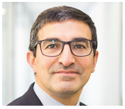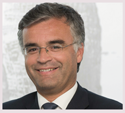Arbitration in Latin America, the Middle East, Africa and Eastern Europe on the increase – Dechert
With investors doing deals in the energy, construction and engineering sectors, arbitration is set to increase, but many cases are not brought due to lack of awareness of third-party funding
Latin America, the Middle East, Africa and Eastern Europe offer the biggest opportunities for Dechert’s arbitration practice, according to Paris-based partner José Manuel García Represa, who is originally from Spain. “There are a lot of Spanish companies investing in Latin America, and there is a lot of Asian investment there, particularly Chinese state-sponsored investment.” Sectors attracting investors include energy and natural resources, construction and engineering.
Though Dechert does not have offices in Latin America, it has experience of handling international arbitration matters involving parties from the region. This work is handled in its Paris, London and Washington DC offices. García Represa, one of four international arbitration partners based in the firm’s Paris office, says that, when it comes to international disputes, having a permanent presence in the relevant jurisdiction is not a priority. “The physical location of the office does not matter in international disputes; what matters is knowing the jurisdiction, the key players, and being present when needed,” he says. García Represa believes that “working closely with Dechert’s arbitration groups in China and Singapore gives us a competitive advantage when assisting clients with matters involving Asian interests in Latin America”.
Africa is another key growth area, according to García Represa. “Africa has been attracting a lot of foreign investment and we’re already doing work in the region, but we need to do more, especially in Francophone and Lusophone Africa.” The firm has experience handling disputes in Francophone and Anglophone Africa, most recently for a Spanish energy group and a French telecoms company. Dechert has also handled disputes in the Middle East from its Dubai office. Meanwhile, Eastern Europe is another region generating opportunities, says García Represa, who adds that the firm has advised the Czech government on various disputes, and advised on construction matters in Bulgaria.
Co-chair of the firm’s global international arbitration practice Arif Ali says the firm has handled a significant number of “high-stakes, multi-billion-dollar commercial and investment arbitrations”. Around half of Dechert’s arbitration practice consists of disputes under international investment treaties, with the remainder consisting of commercial disputes. Fellow co-chair Eduardo Silva Romero says: “We (Dechert) have loyal clients which include multi-national companies, states and state entities.” Among the sectors generating significant arbitration cases are energy, construction/engineering, telecoms, and mining. The firm recently handled a sea port dispute in Ecuador and is currently advising Spanish and Italian companies in disputes concerning highways, as well as US and Dutch clients in a real estate dispute involving the Panamanian government.
Finding the best local firm
García Represa says Dechert’s strategy is to work closely with local law firms in jurisdictions where it does not have an office. “We work with local firms, though we do not have a formal ´best friends’ policy,” he says. “For every case, we want to make sure we find the best professionals for our clients, so we may not always go to the same local firm.” García Represa adds that, while Dechert currently has 14 offices outside the US – in addition to the recently announced association with the Law Firm of Hassan Mahassni in Jeddah and Riyadh, Saudi Arabia – the firm does not have plans to open any offices in new jurisdictions. The firm currently has 28 offices and 900 lawyers around the world.
With regard to the work being targeted, García Represa says: “We’re not doing commoditised work, we’re not taking every case that comes our way; clients come to us for high value-added work.” García Represa wants clients as closely involved in cases as possible. He says it is easier to manage cases, and more cost efficient, if the client is able to “form a joint team with us”.
Many strong claims are not brought because clients are often unaware of third-party funding for arbitration, says García Represa. “There is a big opportunity for third party funders to fund arbitration, sophisticated lawyers know this type of funding is available, but frequently clients don´t,” he adds. García Represa says he tells clients about such funding, though he acknowledges that, in some jurisdictions, it can be controversial. “In some jurisdictions, it’s not in the culture.”












